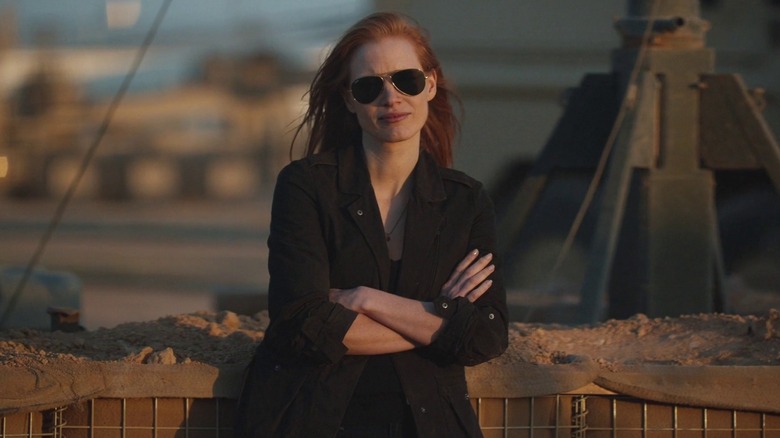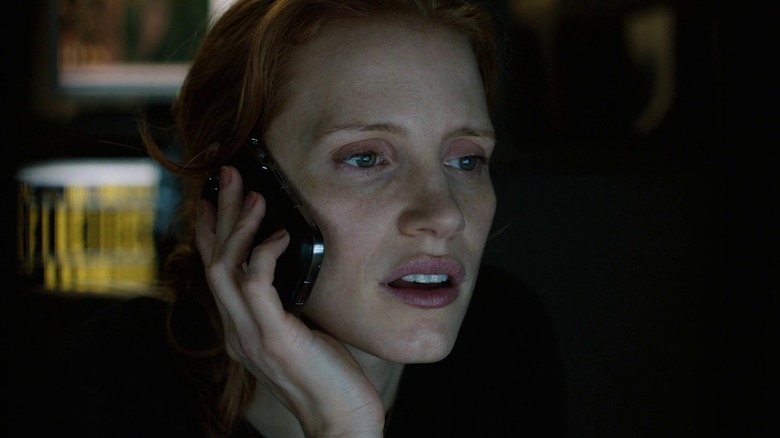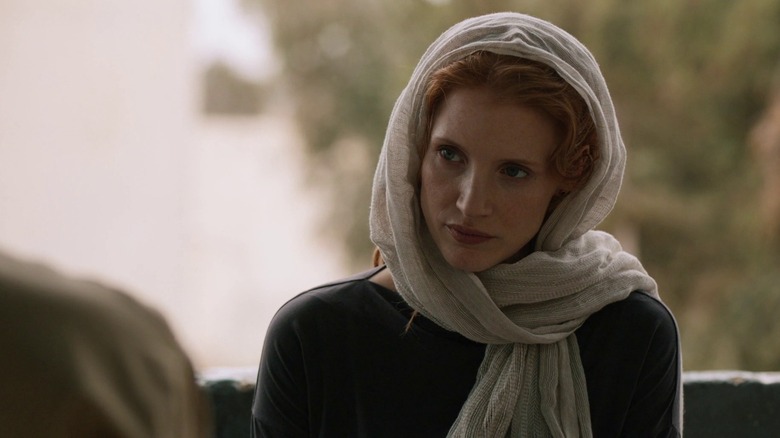Zero Dark Thirty: Jessica Chastain Shares The Personal 'Toll' The Film Took On Her
"Zero Dark Thirty" had a lot of weight on its shoulders when it was released back in 2012. The follow-up to Kathryn Bigelow's "The Hurt Locker," which won six Oscars, including best director and best picture, the spy thriller wasn't quite as successful on the awards circuit as its predecessor but was still well-received nonetheless.
However, for the film's star, Jessica Chastain, the experience wasn't always an enjoyable one. In fact, the actor opened up to Vulture in a 2012 interview about the personal toll that shooting "Zero Dark Thirty" took on her, based on the more traditional values of the area of Jordan where they were filming the torture scenes. She recalled being stopped at a barricade just outside the city of Amman, and things did not go well.
"They started saying something back and forth in a very heated discussion, and I couldn't tell what they were saying because I didn't speak the language. But they started yelling at each other. And then my driver turns to me, and he goes, 'I'm really sorry, Jessica, but you have to walk.' And I said, 'It's okay, I don't mind, I don't need any special treatment.'" Still, the actor was quick to point out that this wasn't how she actually felt about the situation: "No, it's not right, it's not right. It's because they haven't seen a woman [in a while], and they want to watch you."
Culture shock was not kind to Jessica Chastain
"At that moment, I was so angry. I wanted to be like, 'Screw you! I'm not going to play. I'm leaving,'" Jessica Chastain recalled. Though actors often have to adapt somewhat to the places that they're filming in, it sounds like the performer was not comfortable with the way she was treated during the filming of certain scenes.
Unfortunately, the double standards that Chastain experienced during the making of "Zero Dark Thirty" began even earlier, as she was forced to cover herself up almost from the moment that she arrived. "I landed, went straight to set, didn't even go to hair and makeup, put on a robe, and they started filming me in the market," Chastain said. "And that's how it worked every day."
The actor went on to explain how this treatment was also extended to other women, including director Kathryn Bigelow and producer Megan Ellison, while they were filming certain scenes. "Another time, we went to a mosque, and it was completely empty, and we were going to look at the building and stuff," Chastain said. "... They pulled Kathryn, Megan, and myself aside and made us put black robes on." Though the differing cultural values in that part of Jordan help to explain the treatment that the trio received, Chastain's recollection seems to have been largely negative. As a result, the actor was very critical of her experience while filming in the region.
Chastain said that the treatment made her feel invisible
While Jessica Chastain said that she went along with the restrictions, she definitely wasn't happy about it. "There was a cameraman filming the whole thing, and every time he turned to me, I kept turning away, and I finally went up to him and said, 'Don't film me like this!'" the actor explained. "I was shocked, and it really made me feel invisible." Chastain also pointed out other instances of discomfort that she experienced while filming "Zero Dark Thirty."
"There's a very strange relationship they have with women over there," Chastain said. "One time, I went to lunch with three other guys, we sat down at a table at the restaurant of a really nice hotel in Jordan, and the waiter brought menus for the men but not for me." The actor went on to draw further parallels about how she thinks women are seen differently in the region.
"I've seen pictures where you see a couple, and the man is wearing swim trunks, and the woman is wearing a full burka," Chastain pointed out. She also criticized the treatment that women, in general, receive. Though some Muslims argue that burkas are part of their cultural identity, Chastain may not see things that way herself, as she added that she finds it quite strange that women have to cover up more than usual.


